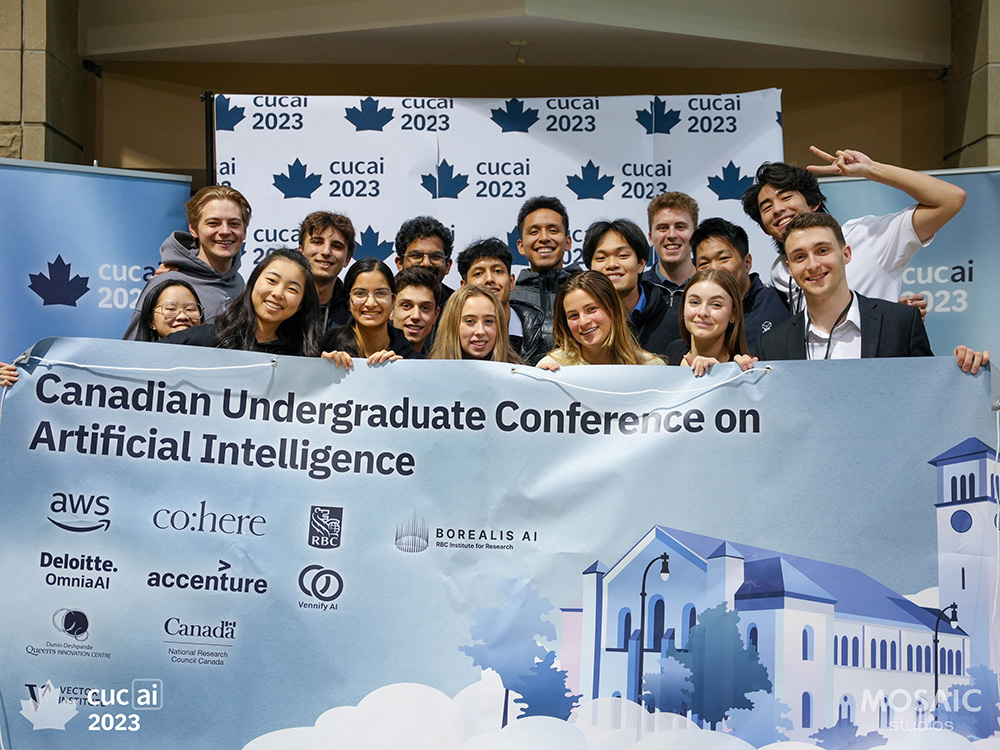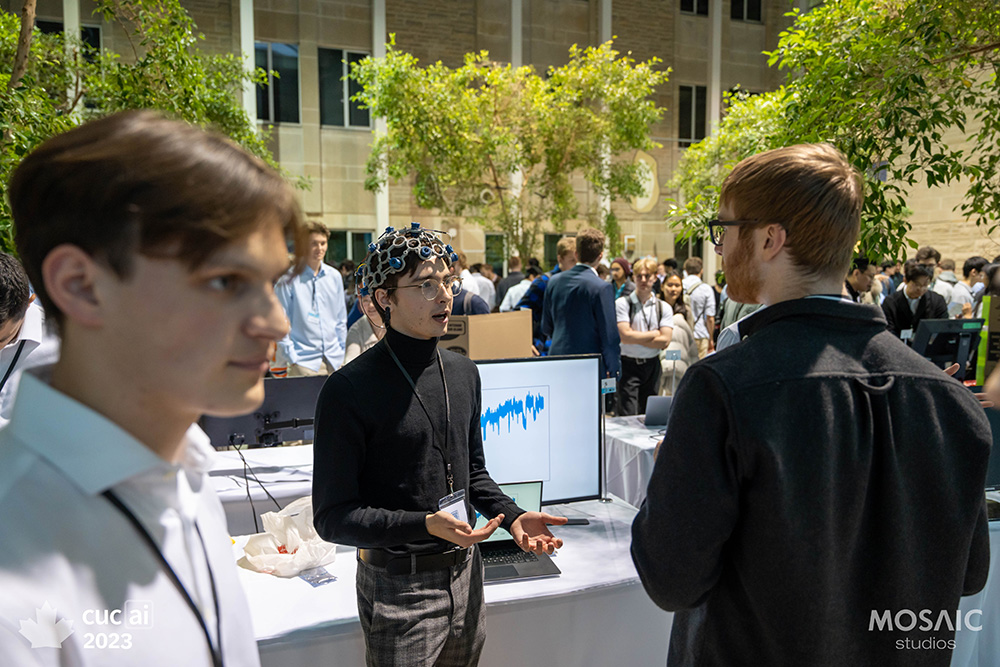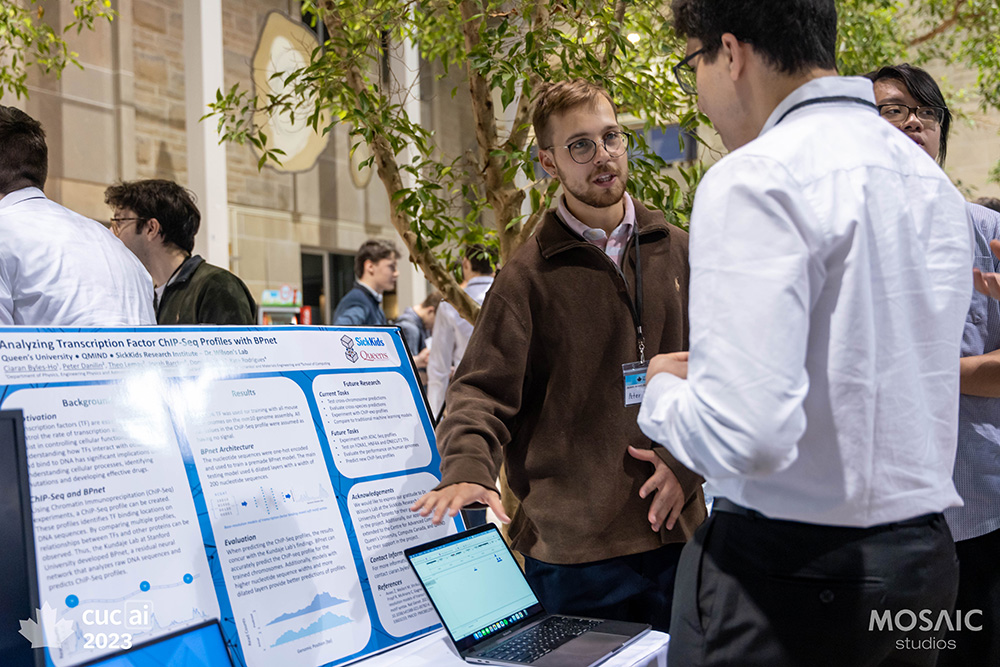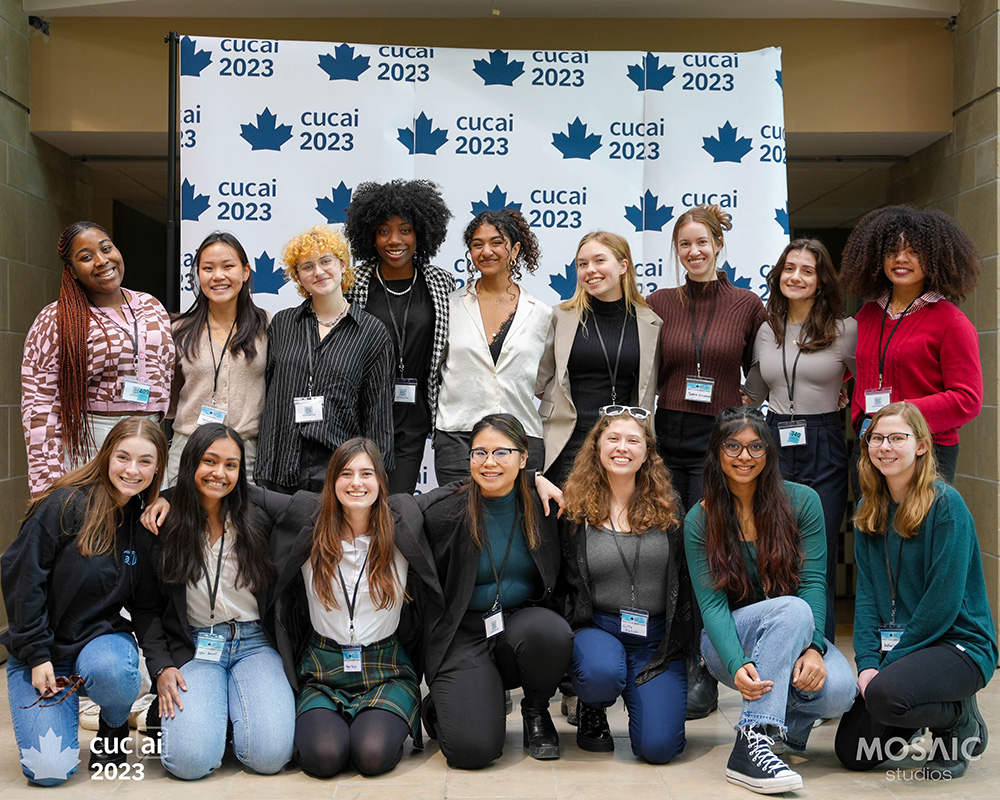The Canadian Undergraduate Conference on Artificial Intelligence, hosted by Queen’s QMIND team, brought delegates and sponsors passionate about AI from across Canada. It is the only undergraduate-exclusive conference of its kind.
When Gonzalo Soto began undergraduate study at Queen’s, he wasn’t sure which discipline in Engineering he would pursue. It’s not uncommon; the universal first-year curriculum is designed for students to consider all options before selecting one in second year. Now a budding entrepreneur, the fifth-year dual degree student (Civil Engineering and Economics) is working to further grow the university’s strong national profile in the tech and AI space.
As co-chair of the Canadian Undergraduate Conference on Artificial Intelligence (CUCAI) along with Chris Gauthier (Computer Engineering) and Cooper Lloyd (Computing), Soto undertook the challenge of presenting a national undergraduate-led tech conference not only in Kingston at Queen’s but notably beyond the Greater Toronto Area and Golden Horseshoe, one of the largest tech hubs in North America outside of Silicon Valley.
There was a huge sense of ‘let’s help each other’ and that’s what got me to fall in love with this. — Gonzalo Soto
“I was accepted into the more recognized tech-leading schools in Canada,” he says, “but I knew there was a different sense of community here. And for me, the community at Queen’s has been monumental. Early in my undergraduate journey, one of my friends suggested I check out QMIND. Everyone there was so nice, not competing with me at all. There was a huge sense of ‘let’s help each other’ and that’s what got me to fall in love with this.”
QMIND is a multidisciplinary, multi-faculty student-led organization at Queen’s which focuses on giving undergraduates experience with real-world applications of AI, machine learning, and other disruptive technologies. Its members formed the organizing committee for CUCAI 2023. Past and present members of the organization have published numerous research papers, completed pro-bono consulting projects, and gone to work at the world’s leading tech companies such as Google, Meta, Microsoft, and Uber.
This year’s committee included — in addition to Soto, Gauthier, and Lloyd — Olivia Xu, Marcelo Chaman Mallqui, Spencer Hill, Jarett Dewbury, Tung Pham, Claire Cunningham, Adi Groumoutis, Aren Jo, Jason Wei, Rabab Azeem, Harley Latsky, Lauren Lidhar, Alwin Raymundo, and Leo Mckee-Reid.
“We brought in industry sponsors including RBC, Cohere, AWS, Deloitte, and Accenture to our event,” he says, “with over 330 delegates, and 56 AI research projects presented. Many students flew in from all around the country and travelled to Kingston just for this event.”
 Exclusively for undergraduates, the CUCAI conference provides two purposes for delegates. First, participation in traditional workshops, keynotes, and networking opportunities; second, a platform to present an AI research project, start-up, or other exploratory disruptive technology project. “It’s kind of like a science fair fuelled by Canada’s brightest minds,” says Soto, “which is the most exciting part. That’s what makes CUCAI different. You get to share your AI project with other students and members of industry who are interested and invested in the buzzing space.”
Exclusively for undergraduates, the CUCAI conference provides two purposes for delegates. First, participation in traditional workshops, keynotes, and networking opportunities; second, a platform to present an AI research project, start-up, or other exploratory disruptive technology project. “It’s kind of like a science fair fuelled by Canada’s brightest minds,” says Soto, “which is the most exciting part. That’s what makes CUCAI different. You get to share your AI project with other students and members of industry who are interested and invested in the buzzing space.”
While the aim of the conference is to provide a space for undergraduates to share knowledge and network, Soto is quick to note that QMIND is able to grow successfully as a team at Queen’s because of its commitment to inclusivity and support for members at all knowledge levels.
“When QMIND was first launched, it was predominantly engineering students,” he says. “But because our projects include so many opportunities to get involved, we were able to engage other faculties and departments. Now we take marketing and recruitment very seriously. Diversity of Thought was our number one priority in recruiting new members last year. We even have a training program, much like a mock course and resource hub, that supplements the AI knowledge of our Project Managers from May through September, when they start their AI projects. This includes direct mentorship and guidance from third- and fourth-year students who’ve worked on AI projects.”
That ‘diversity of thought’ has led to a diversity in membership that organizers of the conference found attractive to its sponsors.
“For job recruitment, we had RBC, Deloitte, Intel, AWS, Accenture, and Borealis AI which is RBC’s AI research and development institute, as well as previous Queen’s-founded Vennify.ai,” he says, “they all came out, and you can’t get that anywhere else.”
The conference was held in Toronto in 2019, before going virtual for the past few years due to the COVID-19 pandemic, but organizers decided this was the year to bring it home to Kingston. “Queen’s University is still growing in recognition as an AI and tech-advanced university, and it was challenging to get companies to commit to having their staff travel to Kingston instead of just dropping by in Toronto. But it worked out perfectly. RBC, for example, sent an entire team of technical and non-technical recruitment staff, as well as some program directors. It was really cool to gain support for such an early initiative.”
“A lot of work, though, for sure. But all worth it in the end. We can’t wait to see Olivia Xu, Marcelo Chaman, and Rabab Azeem take on the conference with full force for CUCAI 2024.”


